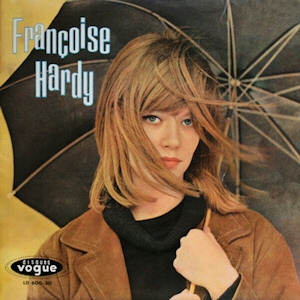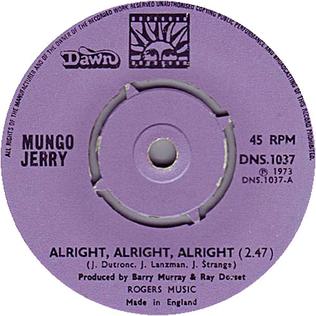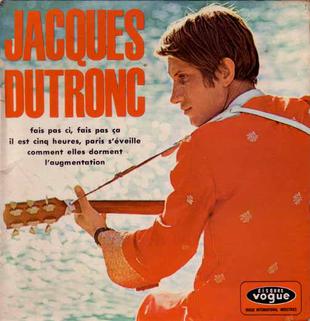
Françoise Madeleine Hardy is a retired French singer-songwriter. Mainly known for singing melancholic sentimental ballads, Hardy rose to prominence in the early 1960s as a leading figure of the yé-yé wave. In addition to her native French, she also sang in English, Italian and German. Her career spanned more than fifty years with over thirty studio albums released.

Jacques Dutronc is a French singer, songwriter, guitarist, composer, and actor. Some of Dutronc's best-known hits include "Il est cinq heures, Paris s'éveille", "Le Responsable", and "Les Cactus".

Véronique Marie Line Sanson is a three-time Victoires de la Musique award-winning French singer-songwriter and record producer with an avid following in her native country.

Jacques Lanzmann was a French journalist, writer and lyricist. He is best known as a novelist and for his songwriting partnership with Jacques Dutronc.
Été 67 is a rock band created in 1998 in Esneux, Belgium. They generally sing in French, but also do some covers in English and Dutch. They musically sound between The Smiths and Jacques Dutronc, with a singer inspired by Bertrand Cantat of Noir Desir.

Tous les garçons et les filles is the debut studio album by French singer-songwriter Françoise Hardy, released in November 1962 on Disques Vogue. Like many of her following records, it was originally released without a title and to be referred to, later on, by the name of its most popular song. Released when Hardy was 18 years old, the album was a commercial success and "went on to top charts". It was originally released in the United States under the title The "Yeh-Yeh" Girl From Paris! in 1965 on "proto-world music label" Four Corners.

Colette Renard, born Colette Lucie Raget, was a French actress and singer. Renard is closely associated with the titular character from the musical Irma La Douce, a role she played for over a decade.

Sophie Huriaux, better known by her stage name La Grande Sophie, is a French singer-songwriter who got her start in the mid-1990s in the Paris alternative scene.

"Alright, Alright, Alright" is a popular song and hit single by the British group Mungo Jerry, first released in 1973.

Jacques Dutronc is the first studio album by the French singer-songwriter Jacques Dutronc, released in 1966. Since Dutronc's first seven albums are all self-titled, the album is commonly referred to by the title of any of its three tracks which were released as singles.

Jacques Dutronc is the second studio album by the French singer-songwriter Jacques Dutronc, released in 1968. Since Dutronc's first seven albums are all self-titled, the album is commonly referred to by the title Il est cinq heures, after one of its singles. It is also sometimes referred to as Comment elles dorment, after its opening track. Jean-Marie Périer was credited for the front cover photography.
"Les play boys" is the second single by French singer-songwriter Jacques Dutronc, released in 1966. It features on his self-titled debut album.
"Les Cactus" is the third single by French singer-songwriter Jacques Dutronc, released in 1967. It is the last from his self-titled debut album.
"J'aime les filles " is a 1967 single by French singer-songwriter Jacques Dutronc.

"Il est cinq heures, Paris s'éveille" is the sixth single by the French singer-songwriter Jacques Dutronc, released in 1968. It appears on his second self-titled album.
"Le courrier du cœur" is the seventh single by the French singer-songwriter Jacques Dutronc. It was released in 1968. The song was recorded for his second album, Jacques Dutronc. It reached number 8 on the French singles chart in summer 1968.

Pierre Antoine Muraccioli, known professionally as Antoine, is a French pop singer, and also a sailor, adventurer, writer, photographer, and filmmaker.
Chantal Rousselot (1946) stage name Cléo is a French yéyé singer popular 1966–1970. She recorded six singles, two of them with Richard Fontaine as the duo Cédric et Cléo, inspired by Sonny and Cher. She married Herbert Léonard whom she met in 1967.
Marc Ogeret was a French singer.

Jean-Pierre Bourtayre was a French composer. He worked for numerous performers, such as Jacques Dutronc, Michel Sardou, and Claude François.













